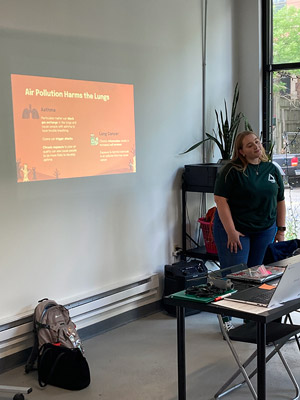Urban Health Project educates, inspires, and challenges medical students through their service to vulnerable populations in Greater Cincinnati to produce more socially responsible physicians who have a greater understanding of factors that impact health.

Urban Health Project strives to improve health care by molding future physicians who will have a personal understanding of the factors that impact health and use this knowledge to provide better care to all populations, especially the underserved.
This year marks the 39th anniversary of Urban Health Project. Urban Health Project was developed in 1986 by medical students at the University of Cincinnati College of Medicine and operates as an entirely student-run, nonprofit 501(c)(3) organization. The core goals of UHP are to improve community-based health care and to provide medical students with meaningful service-learning opportunities.
Two medical student Co-Directors coordinate the internships and conduct fundraising to support the organization. During the summer of 2025, in partnership with 15 partner organizations, 21 medical students were placed in eight-week internships providing service to underserved populations in Greater Cincinnati, including the homeless, mentally ill, disadvantaged women, children, the elderly, at-risk youth, minority populations, refugees, and individuals who struggle with mental disorders or addiction. Please see the Sites page for more information on specific partner organizations. Responsibilities of interns vary widely from site to site. Examples include leading group sessions for those who utilize site services, participating in the daily administrative duties involved in running an agency, and interacting with clients at meals, on outings, and during chores. Other sites request that interns accompany doctors, nurses, counselors, or social workers as they see patients and then allow the interns to use their experiences as medical students to develop projects that benefit clients.
Despite the varying tasks at each site, the objective tying all internships together is the same: allowing medical students to develop a commitment to the community and to gain a better understanding of many cultural, socioeconomic, and environmental factors that impact health while simultaneously contributing to the care of those who have the greatest need for support and assistance.
At the end of the summer, the Co-Directors coordinate the Committed to Community Event for everyone involved in Urban Health Project. This forum is a way for the community to learn about each intern's individual experience at their site, as well as to celebrate the contributions that each intern makes to further the mission of Urban Health Project. For this event, held each year at the end of July or beginning of August, interns present posters displaying information about their sites, their experiences, and their projects to those in attendance.

Despite the varying tasks at each site, the objective tying all internships together is the same: allowing medical students to develop a commitment to the community and to gain a better understanding of many cultural, socioeconomic, and environmental factors that impact health while simultaneously contributing to the care of those who have the greatest need for support and assistance.
At the end of the summer, the Co-Directors coordinate the Committed to Community Event for everyone involved in Urban Health Project. This forum is a way for the community to learn about each intern's individual experience at their site, as well as to celebrate the contributions that each intern makes to further the mission of Urban Health Project. For this event, held each year at the end of July or beginning of August, interns present posters displaying information about their sites, their experiences, and their projects to those in attendance.